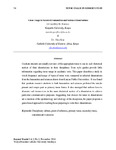Tense Usage in Selected Humanities and Science Dissertations
| dc.contributor.author | Maroko, Geoffrey M. | |
| dc.contributor.author | Kiai, Alice | |
| dc.date.accessioned | 2019-07-31T06:40:05Z | |
| dc.date.available | 2019-07-31T06:40:05Z | |
| dc.date.issued | 2014 | |
| dc.identifier.uri | http://ir.mksu.ac.ke/handle/123456780/4680 | |
| dc.description.abstract | Graduate students are usually not sure of the appropriate tense to use in each rhetorical section of their dissertations in their disciplines. Even style guides provide little information regarding tense usage in academic texts. This paper describes a study in which frequency and usage of types of tense were compared in selected dissertations from the humanities and sciences drawn from Kenyan Public Universities. It was found that graduate research students in both humanities and sciences preferred the simple present and simple past as primary tense forms. It also emerged that authors have to alternate verb tenses even in the same rhetorical section of a dissertation to achieve particular communicative purposes. Suggesting that choices for tense in dissertations are a function of the epistemology and ideology of the disciplines, the paper proposes a genre-based approach to teaching those preparing to write their dissertations. | en_US |
| dc.language.iso | en_US | en_US |
| dc.subject | Disciplinary culture | en_US |
| dc.subject | Point of reference | en_US |
| dc.subject | Primary tense | en_US |
| dc.subject | Secondary tense | en_US |
| dc.subject | Communicative purpose | en_US |
| dc.title | Tense Usage in Selected Humanities and Science Dissertations | en_US |
| dc.type | Article | en_US |

